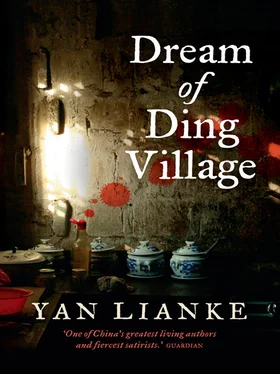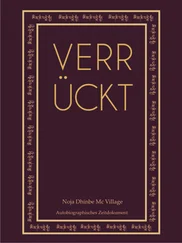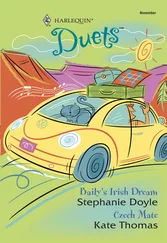As the men drove the suns towards the horizon, their women and children and old people stood outside the village gates, banging on drums and gongs and washbasins to spur the men on and boost their morale. The suns raced across the sky, pursued by gangs of armed men on the plain below. Everywhere they went, the earth trembled and the air was filled with fire and smoke and the sound of their killing cries. Smoke rose from the grass and soil, trees and houses went up in flames, consumed by the heat of too many suns. There was fire and smoke and ashes, ashes everywhere . . the mob had caught up with one of the suns and were just about to bring it down, to topple it from the sky, when Grandpa heard someone pounding on his door.
*
One of the village men had run into the schoolyard and was shouting and pounding on his door.
‘Professor Ding, Professor Ding, come quick! Someone broke into your son’s grave!’
Grandpa awoke from his dream to find sunlight streaming through his window, warming his bed in its fire. He leaped out of bed and raced towards the cemetery with the man from the village. When they arrived, a crowd was milling around the entrance to Uncle’s tomb, inspecting the broken bricks and toppled headstone. All the soil used to fill the entrance to the grave had been dug up, leaving a gaping pit and mounds of dirt on either side. Grandpa took off his shoes, climbed down into the pit barefoot and peeked into the burial chamber. He saw that Uncle and Lingling’s corpses had been pulled from their coffins and tossed on the ground. The coffins and the items inside them — brand-name liquor and cigarettes, expensive clothes and jewellery — were gone. The thieves had apparently brought tools, because some of the engravings were missing from the walls. A large chunk had been gouged from the left-hand wall of the tomb, leaving a small pile of debris beside Uncle’s head, and bits of soil clinging to his hair and skin. The big-city scene on the right-hand wall looked like it had been hit by an earthquake: houses and buildings toppled, bridges and overpasses collapsed, and the ground around Lingling’s body littered with clods of dirt and chunks of debris. The tomb had been ransacked. Grave robbers had taken everything.
A cold, dark stench of decay hung in the air.
As Grandpa stood at the entrance to the burial chamber, he remembered a bit of doggerel he’d heard as a child. It was an old folk saying here on the plain, a truism passed from generation to generation:
When graves are robbed of treasure,
there’s not enough treasure to go around.
When graves are robbed of coffins,
there are too many coffins to be found.
VOLUME 7

1
It was a summer of drought. Drought swept across the plain like fire. The heat of too many suns in the sky.
By late August, the height of summer, the plain hadn’t seen a drop of rain in nearly five months. The last rainfall had been in early April. At first, the farmers, unaware of the drought, had diverted water to their fields any way they could. They dug deep irrigation wells and used diesel engines from tractors to pump even more water from the earth. By June and July, the wheat was in ear, the cottonwoods were in bloom, and there was no moisture left in the ground. With no nearby rivers to draw from, the soil was parched.
The wheat had grown knee-high, but as the drought wore on, it turned brittle and dry. In the early days of the drought, the young plants woke refreshed and green, nourished by the moist night air. Now morning found them looking soggy, as if their leaves and spines had wilted overnight. When the sun burst from the eastern horizon and roared into the sky, the plants were dry, their leaves brittle under the burning sun, and their heads drooped, crumbling at the slightest touch. With each gust of wind, chalky dust rose from the scorched earth and swirled across the plain. A stench of something burning filled the air.
The plain was as pale as ashes, as far as the eye could see.
The leaves on the trees withered and curled. The scholar trees, whose shallow roots couldn’t absorb enough moisture from the soil, began shedding yellow leaves, as if autumn had come early. The deep-rooted elms remained green, but they attracted legions of insects. The whole insect kingdom converged on their branches and leaves. Small green worms, spotted ladybirds and yellow beetles turned the elms into private fiefdoms, marching up and down the branches, munching on the stems and leaves.
Insects that hung from branches were liable to drop. If you passed below an elm, you could feel them plopping on your head.
The trees that once shaded the village were gone. Now, if you stood beneath a tree, you could feel sunlight on your face. The village, once green, was barren. It blended into the landscape.
Crops died in the fields. Grass withered on the plain. The soil was bleached, as far as the eye could see.
The last survivors stood out, pale yellow patches in a sea of bleach.
Some of the trees, still alive but unable to support so many leaves, had thinned their foliage so that only the trunk and roots remained. The drought-resistant cicadas, however, were thriving, multiplying, buzzing day and night. By day, their cries were everywhere, like chilli peppers spread out to dry in the sun. By night, their cries were sparser, hanging from the branches like grapevines on an arbour.
When the sun rose every morning, the branches of trees gleamed with cicadas, their wings and bodies glinting golden yellow in the sunlight. All day long, a burnt stench hung over the plain. Dark plumes of smoke rose from the ground. At sunset, the smoke vanished, and the plain turned to fire. By nightfall, everything was ashes.
You looked forward to the end of each day, but the next one always came too soon. The sun rushed in while you were still slumbering in your bed, exhausted from the night before. The early evening was too hot for sleep, so it was only after midnight that you found some rest. But as soon as your head hit the pillow, the sun was up again, crawling through the doors and windows, warming your blankets, stroking your body and tickling your face. If you tried to ignore it, if you tried to roll over and go back to sleep, you were sure to be awakened by a disturbance of a different kind: footsteps ringing through the streets, sounds outside your window, a knock on your door and a voice telling you that someone else in the village had died.
‘Uncle, you’ve got to come and help. My mother’s gone. She died early this morning.’
‘Sorry, brother, but I need to call in that favour. When your family needed help, I came and worked for three days. Now we need your help, but it’s only for one day.’
And so another day began, another day of scorched earth.
Fire rolled across the plain.
A hundred thousand suns, burning up the sky.
2
It was a summer of fever. Fever swept the plain, just like everyone said it would.
Winter and summer had always been seasons of death, when freezing-cold temperatures or sweltering heat claimed the most sick and elderly lives. Old-timers on the plain said that all the Qing dynasty emperors had died either in the depths of winter or the height of summer. But for those in Ding Village, those already sick with the fever, this would be the summer that they died. Having lived through the winter, they had expected to survive another year, but the drought proved too much for them. The heat was too extreme. The sun cremated the earth, raising purple smoke from the soil. The air scalded people’s throats and raised blisters on their lungs.
Читать дальше













